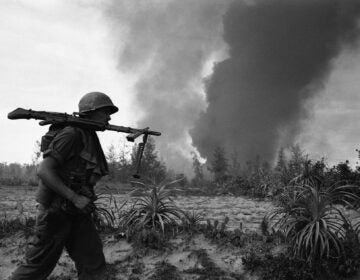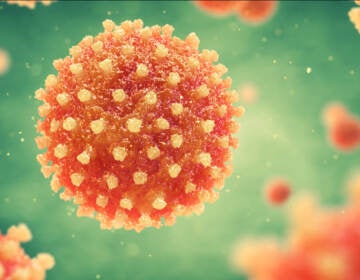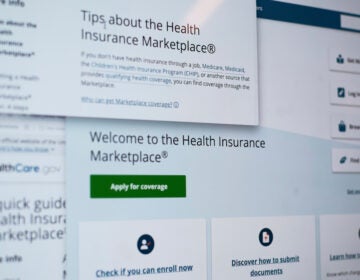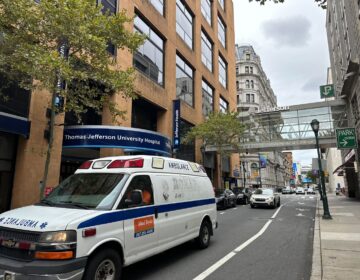50 years after Vietnam War’s end, expanded hepatitis C screening in Philly leads to more veterans cured
The rate of hepatitis C infections is higher among Vietnam War veterans and others who may have been exposed during their service more than 50 years ago.
Listen 1:07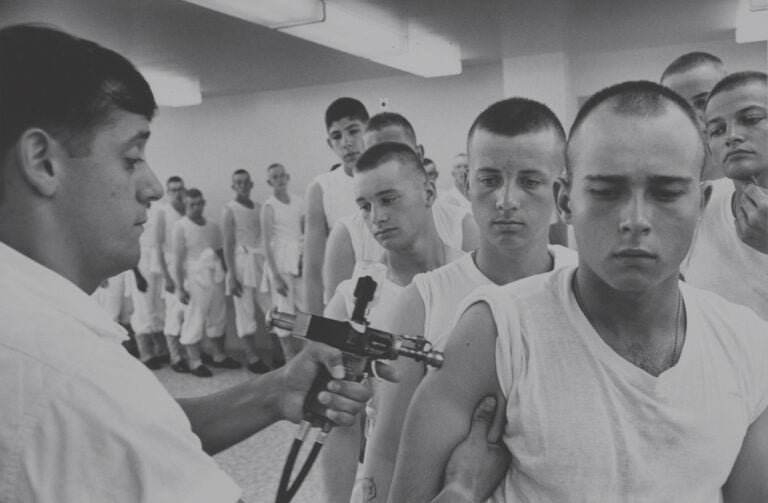
Navy recruits in 1965 wait in line for immunizations during recruit training at Naval Station Great Lakes. (U.S. Naval Institute/Facebook)
From Philly and the Pa. suburbs to South Jersey and Delaware, what would you like WHYY News to cover? Let us know!
The Vietnam War ended 50 years ago today with the fall of Saigon, but the war’s lasting impact continues.
The extensive mental health toll on soldiers who were in combat zones and cases of cancer and deformities among veterans and Vietnamese people who were exposed to the chemical Agent Orange have been well documented.
But perhaps lesser known is the fact that many Vietnam veterans were diagnosed with hepatitis C, a potentially deadly bloodborne viral infection of the liver, in the decades after the war’s end.
It’s pushed public health experts in Philadelphia, at the U.S. Department of Veterans Affairs health care system and advocates with veterans organizations to ramp up testing efforts to catch more cases and administer curative treatments.
“Which 15 years ago didn’t exist,” said Danica Kuncio, viral hepatitis program manager at the city Department of Public Health. “So over the past decade, having these treatments available for folks has been a game changer.”
History of hepatitis C and the Vietnam War
Viral hepatitis C wasn’t officially identified and named until 1989. People primarily become infected from blood-to-blood contact, according to the Centers for Disease Control and Prevention.
Injection drug use is a leading cause of new cases today in Philadelphia, city health experts said, but people can still get it from contaminated needles in health care settings, tattoos and piercings, unprotected sex and at birth if the mother has the virus.
“And then there are folks who we talk to and we have no idea how they got it, because they got it decades ago,” Kuncio said.
During the Vietnam War, some reports indicate that soldiers may have also become infected through blood transfusions, unsanitized medical equipment or sharing items like razors that came in contact with blood.
Between 2.4 and 4 million people in the U.S. are living with chronic hepatitis C, according to estimates in recent years. Federal data shows that veterans enrolled in health care at the VA have a higher rate of infection — about 5.4% of veterans nationally — compared to the general population.
Hepatitis C can be asymptomatic for years or even decades, Kuncio said, so some veterans who became infected during the war likely never knew they were sick. By the time symptoms like jaundice did appear, there may have already been significant damage to the liver.
“Once that damage starts to accumulate, they can develop cirrhosis, fibrosis, cancer and, in some cases, death,” Kuncio said.
That’s why testing is crucial, she said. The CDC recommends universal screening for all adults at least once in their lifetime, and among pregnant women with each pregnancy. More frequent testing is recommended for people who inject drugs or who regularly get hemodialysis for medical conditions like renal failure.
Specific groups like Vietnam War veterans and baby boomers, born between 1945 and 1965, have been targeted for testing because of a lack of screening in earlier years when they may have unknowingly become infected.
“Unfortunately, we know that not all of these folks have been screened,” Kuncio said, “and really should be seeking out these screenings and their providers should be prioritizing it, because they might be at the tail end of having it for decades at this point.”
Hepatitis C today
The Philadelphia Department of Public Health has worked with local VA health care systems to get more people screened and treated. More than 52,000 people in Philly alone, including Vietnam War veterans, are estimated to have had hepatitis C and are still alive today, according to city data.
These efforts have involved large-scale public health campaigns and integrating hepatitis C screening education and practices into primary care and specialty care offices.
“Not everybody who is a veteran necessarily seeks care at the VA, or not every time,” Kuncio said. “So the hope would be you go to your primary care provider, there’s an alert in the electronic medical record that says, ‘Oh, this person hasn’t received their one-time screening for hepatitis C,’ and we’re going to screen them.”
Kuncio said health experts have also had to battle the stigma associated with the disease in order to encourage people to seek out screening and testing.
“And there’s a lot of folks who have a lot going on and they don’t necessarily want that diagnosis and are scared,” she said. “It’s understandable. We hope that fear doesn’t keep people from seeking care, because there is a cure and it’s accessible to all people.”
WHYY is your source for fact-based, in-depth journalism and information. As a nonprofit organization, we rely on financial support from readers like you. Please give today.


